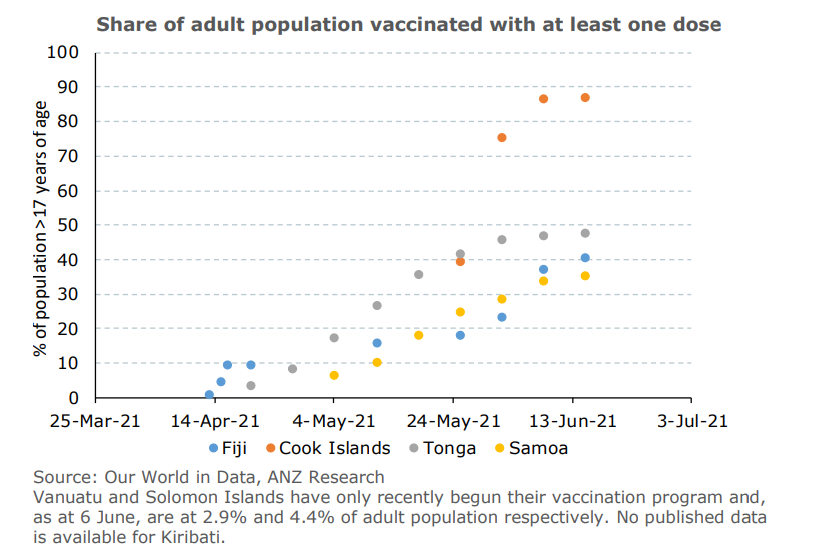-
Published June 25 2021
The COVID-19 vaccine rollout in the Pacific islands has so far exceeded expectations, in positive news for the region’s prospects of an economic recovery. In part, this is a result of assistance from the region’s development partners, in particular Australia and New Zealand.
Fiji (the Pacific islands’ most populous country) aims to vaccinate 53 per cent of its adult population (one dose each for about 316,000 people) by the end of June and have all adults fully vaccinated by October.
Vanuatu, Samoa, Tonga, Kiribati, Solomon Islands and Cook Islands have all commenced their vaccination programs. Cook Islands is most advanced.
With optimism on vaccine deployment rising, ‘herd immunity’ could be reached before the end of the year, and international tourism may return to the Pacific islands in late 2021 and build momentum into 2022.

However, risks remain. Setbacks on vaccine efficacy (for instance, if approved vaccines are unable to neutralise new variants) will keep borders shut for longer and delay the economic recovery.
On the positive side, a quicker rollout of vaccines to between 80 per cent and 85 per cent of the adult population could see international borders reopen earlier. Furthermore, many Pacific island countries have not had any community transmission of the virus.
Travel bubbles, where quarantine-free travel between countries or regions with low or no incidence of COVID-19, could be implemented before herd immunity is achieved.
New Zealand and the Cook Islands have already established a safe travel corridor. Naturally, if a safe travel corridor can be implemented, then tourism could return sooner, which would be a welcome economic boost.
However, Fiji’s recent community outbreak has probably delayed a safe travel zone with neighbours Australia and New Zealand until later in the year.
Kishti Sen is an International Economist & Tom Kenny is Senior International Economist at ANZ
This story is an edited version of an ANZ Research report. To read the original report, click HERE.
Related articles
-
The $US is shifting form, and recent depreciation is likely to be the new normal.
2025-06-18 00:00 -
A new approach to asset financing is building equity in First Nations suppliers to the mining industry. First Nations procurement targets in other industries could be met with a similar approach.
2025-06-10 00:00 -
The road to normalisation in the world’s largest bilateral trading relationship looks complex.
2025-05-28 00:00
This publication is published by Australia and New Zealand Banking Group Limited ABN 11 005 357 522 (“ANZBGL”) in Australia. This publication is intended as thought-leadership material. It is not published with the intention of providing any direct or indirect recommendations relating to any financial product, asset class or trading strategy. The information in this publication is not intended to influence any person to make a decision in relation to a financial product or class of financial products. It is general in nature and does not take account of the circumstances of any individual or class of individuals. Nothing in this publication constitutes a recommendation, solicitation or offer by ANZBGL or its branches or subsidiaries (collectively “ANZ”) to you to acquire a product or service, or an offer by ANZ to provide you with other products or services. All information contained in this publication is based on information available at the time of publication. While this publication has been prepared in good faith, no representation, warranty, assurance or undertaking is or will be made, and no responsibility or liability is or will be accepted by ANZ in relation to the accuracy or completeness of this publication or the use of information contained in this publication. ANZ does not provide any financial, investment, legal or taxation advice in connection with this publication.